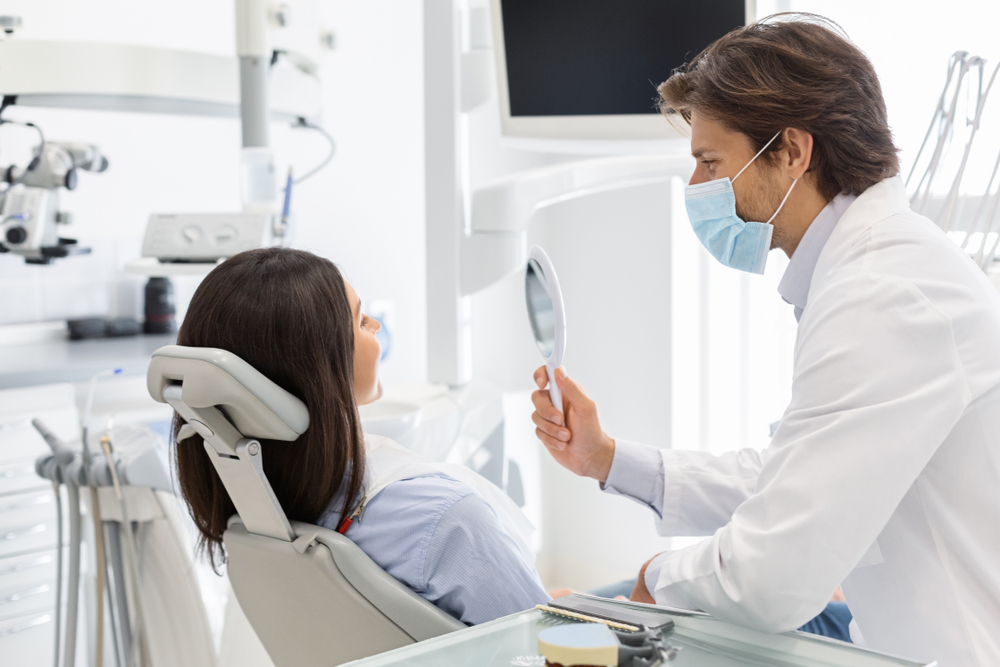
Gum disease is reversible. If you think you have gum disease, schedule an appointment with your dentist to treat it before it’s too late.
Along with tooth decay, gum disease ranks as the most severe and widespread dental problem in the country, with nearly half of all adults over age 30 and 70% of those over 65 showing some signs of gum disease.
Neglecting your oral health puts you at greater risk of gum disease. But gum disease, or periodontitis, can also develop due to a genetic predisposition or chronic conditions such as diabetes. Whatever the cause, gum disease will not resolve itself without treatment from your dentist. As such, schedule an appointment with your dentist as soon as you suspect gum disease!
What is gum disease, and why is it so serious?
An ongoing buildup of plaque and bacteria causes an infection and inflammation of the gums. Daily brushing removes most of the plaque and bacteria on your teeth and gums. But if you fail to brush your teeth daily, the bacteria and plaque can flourish, forming a hard substance called tartar. Tartar, and the bacteria that attach to it, will continue to infect and inflame the gums, even potentially affecting the bone tissue underneath the gums.
Periodontitis is a progressive disease, meaning it passes through stages. Gingivitis is the earliest stage and is marked by tender, swollen gums and bleeding when brushing. Gingivitis can be cured with a dual treatment by your dentist called scaling and root planing, which involves thoroughly cleaning the gums and tooth roots of bacteria.
But if gum disease advances beyond the gingivitis stage, periodontitis, the most severe form of gum disease, develops. Periodontitis progresses through three stages:
Mild. Bacteria and tartar erode the gum tissue, resulting in noticeable gaps between the tooth and gum line.
Moderate. More erosion of the gum tissue and bone supporting the tooth can cause the gums to feel extremely sore and tender.
Severe. In this final and severe stage of periodontitis, bone loss is so advanced that teeth become loose and may fall out. Gums may become infected with pockets of pus noticeable. Bad breath and an unpleasant taste in the mouth are also present.
Gum disease is more than a severe oral health issue. It can affect your entire body. In fact, research has suggested a link between gum disease and heart disease, likely due to the inflammation in the gums spreading to the heart tissue. But you can avoid such complications with a trip to your dentist at the earliest signs of gum disease.
You can prevent gum disease!
As mentioned earlier, gingivitis can be reversed with non-surgical treatments if caught early enough. Periodontitis cannot be reversed at the latter stages, but it can be managed with dental surgery that builds up the bone and gum tissue with grafts. Excellent oral hygiene and regular monitoring by your dentist will keep gum disease from progressing further into possible tooth loss.
But you can dodge those complications with prevention, such as these practices:
Brush and floss daily. Brushing twice daily with fluoride toothpaste and flossing between teeth reduce the amount of bacteria and plaque on your teeth. Rinse with an antiseptic mouthwash.
Stop smoking. Tobacco is a risk factor for gum disease and makes it harder to heal from periodontitis treatments.
Limit starches and sweets. Sugar and starches promote the growth of bacteria and plaque. Limit those foods to an occasional indulgence and brush afterward.
Don’t skip your dental checkups! Those twice-annual checkups sallow your dentist to examine your teeth and gums for any evidence of gum disease. Prompt treatment can restore the health of your gums.
Meet the gum disease specialists in Fort Collins
Schedule an appointment at Espire’s Fort Collins, CO, location today! Our highly trained dentists have years of treating all stages of gum disease. Let us help you reverse or manage your periodontitis. Don’t live near our Fort Collins, CO, office? Find one of our other locations near you.
Fort Collins
2117 Custer Drive
Fort Collins, CO 80525


